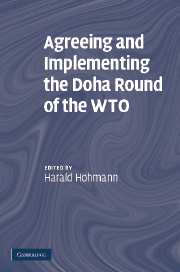Book contents
- Frontmatter
- Contents
- List of Contributors
- Foreword
- Introduction
- The future of the Doha Round
- PART ONE Development policy of the WTO
- PART TWO Trade policy (including competition) and trade facilitation
- PART THREE Reform of the dispute settlement system
- 11 Reforming the dispute settlement system through practice
- 12 Reforming the Dispute Settlement Understanding
- 13 The WTO dispute settlement system: Jurisdiction, interpretation and remedies
- 14 An evaluation of the role of legal aid in international dispute resolution, with emphasis on the Advisory Centre on WTO Law
- PART FOUR Social rights, health, and environment
- PART FIVE Conclusions
- Index
11 - Reforming the dispute settlement system through practice
from PART THREE - Reform of the dispute settlement system
Published online by Cambridge University Press: 23 February 2010
- Frontmatter
- Contents
- List of Contributors
- Foreword
- Introduction
- The future of the Doha Round
- PART ONE Development policy of the WTO
- PART TWO Trade policy (including competition) and trade facilitation
- PART THREE Reform of the dispute settlement system
- 11 Reforming the dispute settlement system through practice
- 12 Reforming the Dispute Settlement Understanding
- 13 The WTO dispute settlement system: Jurisdiction, interpretation and remedies
- 14 An evaluation of the role of legal aid in international dispute resolution, with emphasis on the Advisory Centre on WTO Law
- PART FOUR Social rights, health, and environment
- PART FIVE Conclusions
- Index
Summary
Introduction
The present chapter is a brief reflection on the lack of progress in the negotiations on the reform of the WTO Understanding on Rules and Procedures Governing the Settlement of Disputes (DSU) and suggests an alternative to their continuation at this stage.
A brief history of the dispute settlement system
The original basis for dispute settlement in the GATT is Article XXIII (which is still in force), entitled ‘Nullification or Impairment’. Paragraph of this provision states that:
If any contracting party should consider that any benefit accruing to it directly or indirectly under this Agreement is being nullified or impaired or that the attainment of any objective of the Agreement is being impeded …
…
the contracting party may, with a view to the satisfactory adjustment of the matter, make written representations or proposals to the other contracting party or parties which it considers to be concerned. Any contracting party thus approached shall give sympathetic consideration to the representations or proposals made to it.
Paragraph goes on to provide that:
If no satisfactory adjustment is effected between the contracting parties concerned within a reasonable time … the matter may be referred to the CONTRACTING PARTIES. The CONTRACTING PARTIES shall promptly investigate any matter so referred to them and shall make appropriate recommendations to the contracting parties which they consider to be concerned, or give a ruling on the matter, as appropriate. … […]
- Type
- Chapter
- Information
- Agreeing and Implementing the Doha Round of the WTO , pp. 261 - 268Publisher: Cambridge University PressPrint publication year: 2008
- 1
- Cited by



